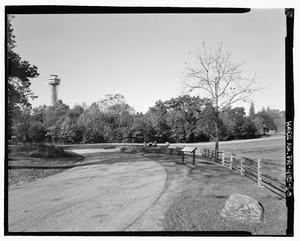Gettysburg National Tower facts for kids
Quick facts for kids Gettysburg National Tower |
|
|---|---|
| General information | |
| Status | Demolished |
| Type | observation deck |
| Location | Gettysburg, Pennsylvania, United States |
| Coordinates | 39°48′54″N 77°13′50″W / 39.81500°N 77.23056°W |
| Construction started | 1972 |
| Completed | 1974 |
| Opening | July 29, 1974 |
| Closed | 2000 |
| Demolished | July 3, 2000 |
| Cost | $2.5 million USD |
| Height | |
| Antenna spire | 120 m (390 ft) |
| Top floor | 94 m (307 ft) |
| Technical details | |
| Floor count | 4 |
| Lifts/elevators | 2 |
| Design and construction | |
| Developer | Thomas R. Ottenstein |
The Gettysburg National Tower was a very tall observation tower in Gettysburg, Pennsylvania. It stood 307-foot (94 m) (about 94 meters) high. From 1974 to 2000, it overlooked the famous Gettysburg National Military Park.
This privately owned tower allowed visitors to pay a fee to go up to its observation decks. From there, they could see the historic battlefield. However, the tower was quite controversial, even before it opened. In the end, the government took control of it, and it was torn down.
Contents
The Tower's Story: Why It Was Built and Removed
The Gettysburg National Tower was built in 1974. A real estate developer named Thomas R. Ottenstein built it on his own land. This land was right next to the Gettysburg National Military Park.
Early Opposition to the Tower
Many people were against the tower being built. This included the National Park Service, which manages the park. People who wanted to protect historical sites also opposed it. Even local residents didn't want it there.
The governor of Pennsylvania at the time, Milton Shapp, tried to stop the building. He filed lawsuits, but they were not successful. The Park Service couldn't do much because the tower was not inside the park's official boundaries.
The Tower Becomes Part of the Park
In 1990, a new law was passed. This law said that the land where the tower stood would become part of the national park. Then, in June 2000, a federal judge allowed park officials to take ownership of the tower itself. The tower's owners were paid $3 million for it.
The Tower's Demolition
The Gettysburg National Tower was taken down using explosives. This happened on July 3, 2000. This date was special because it was the 137th anniversary of the last day of the Battle of Gettysburg.
The public was invited to watch the demolition. An event was even set up to make it look like cannon fire caused the tower to fall.
How the Tower Was Built
The tower had a special design called a hyperboloid design. This shape is curved inward in the middle. Engineers used computer simulations to check if the design was strong enough. They used a powerful computer called a CDC 6600 mainframe for this.
Key Design Features
- The bottom of the tower was 94 feet (29 m) (about 29 meters) wide.
- It narrowed to 36 feet (11 m) (about 11 meters) in the middle.
- The top spread out to 78 feet (24 m) (about 24 meters) wide.
The large pieces of the tower were put together using the biggest crane available at the time. They were bolted together, not welded. Joel Rosenblatt, the tower's engineer, believed its design was so special that it should be preserved.
Inside the Observation Tower
Inside the tower's unique structure were elevators. There was also a staircase with 520 steps leading up to the observation decks. The observation area had two indoor levels with air conditioning. There were also two open-air decks at the very top. These decks had binoculars and information about the historical sights.
Thomas Ottenstein, the developer, called the tower a "classroom in the sky." However, those who opposed it said its large size made it stand out too much.
 | Isaac Myers |
 | D. Hamilton Jackson |
 | A. Philip Randolph |


